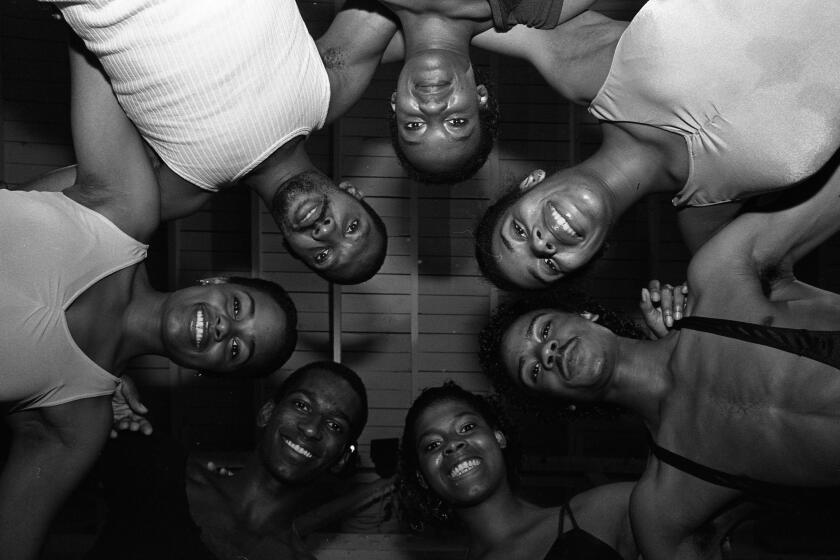Growing up different: Making adjustments to survive in a mostly white world
This story originally ran in 1982 as part of the “Black L.A.: Looking at Diversity” series. We have preserved the original text in order to provide an accurate account of the work in print.
Carol and Theresa, two friends among a handful of black sales representatives for a large firm, distinctly remember their first corporate meeting.
When the session adjourned they spotted three other blacks in the room. The two women walked over and the group started talking cordially. After a few minutes, Carol’s boss made a beeline for her.
“Now, now, no black caucusing,” he whispered in her ear. “Mix.”
“Five hundred people in a room,” Carol fumed later. “Five blacks get together and it’s a revolution.”
Now Carol and Theresa say they make a point of not congregating with other blacks at corporate meetings.
Blacks have always been more in tune with white culture because they have grown up immersed in the pervasive white culture while trying to keep a foot in each world. Now that more blacks are moving into formerly lily-white arenas, the lack of exposure that many whites have had to black culture becomes extremely apparent.
In the summer of 1982, The Times published a series on Southern California’s Black community called “Black L.A.: Looking at Diversity.”
::
The telephone rang at my desk. It was a suburban Los Angeles public official I needed to interview. We agreed to meet the next day at a political gathering.
With some amusement, I now remember this man as “Mayor Lobo” because he reminded me of the TV sheriff.
I arrived on time and introduced myself as the reporter he had talked to earlier by phone. I gave him my business card and extended my hand for a handshake.
Mayor Lobo seemed paralyzed. I think he wanted to shake my hand, but I don’t know. Maybe the glare from his white patent leather shoes was blinding him.
“You’re Janet Clayton?” he asked in a tone of utter astonishment.
“Yes,” I replied.
“You’re a writer?”
“Yes,” I said again, this time through gritted teeth.
“Well, I think that’s wonderful,” he said, that patronizing tone settling in his voice.
My facial expression must have soured, because for a split second, Mayor Lobo seemed to acquire sensitivity.
“I didn’t mean nothing by that,” he said apologetically. “I mean, it’s not like I think you should be washing windows or nothing. ...”
With that last statement, Mayor Lobo had fallen, foot-in-mouth, into the “but-you-don’t-sound-black-on-the-telephone” abyss. Somehow the interview proceeded, although I honestly don’t remember how I made the transition from washing windows.
::
My own informal survey among black friends confirms that generally there are two categories for social functions — “work party” and “party party.”
Both can be enjoyed at different levels.
While definitions of these two distinctly different gatherings are amorphous, when a black person walks into a party and there is no music and every light in the house is burning brightly, that’s a good tip-off that it is a “work party.”
I’d struggled to convince my friend that we should arrive at his white co-worker’s birthday party no later than 9:30 p.m. It went against our grain because for blacks, a Saturday night party, unless it’s a sit-down dinner rarely gets rolling before 10 p.m.
Nevertheless, we arrived at 9:30. No sooner had we hit the door than the host rushed and said: “Well! Thought you weren’t coming!”
“Weren’t coming!” My friend whispered to me incredulously. “It’s only 9:30!”
::
Work parties are interesting because they are a chance to associate with people of different ages, political persuasions and outlooks. But many of the people I’ve encountered at these parties have a personal knowledge of blacks that seems limited to what they have seen on television series such as “The Jeffersons” or worse, “Gimme a Break.”
So when the need for casual non-work-related conversation arises, often the only blacks familiar to them — Lena Horne, Richard Pryor or the latest black sports hero — crop up.
A conversation about, say, taxes, can take an amazing sudden leap: “Taxes have gotten so out of hand. Why, in my day ... say, Janet, where are your parents from? The South? You know, I’ll never forget when I was stationed in Atlanta in 1943 and I saw that fabulous Lena Horne ...”
::
During another party conversation, someone asked a black friend of mine where she lived. My friend replied in the neighborhood of Pico and Hauser boulevards, a middle-income area that in recent years has become largely black.
“Oh yes,” a white listener remarked quite sincerely. “That used to be a nice neighborhood.”
That person, of course, lives in a nice, safe neighborhood — one that is plagued each year with disastrous brush fires, life-threatening floods and devastating mud slides.
::
And then there are those curious little statements, “Gee, your hair is curly today. Did you get a perm?”
“No, if I got a perm my hair would be straight.” (Try explaining that one.)
Or, “Hey, I just got back from Tahiti, and see, I’m darker than you.”
“Uh-huh,” I sometimes tease, “Now what will you do if it doesn’t fade?”
It all points to a lack of information and understanding, a need for equal exchange between black and white cultures.
Maybe once the black presence in the boardrooms is no longer such a rarity, questions about the texture of our hair and the rhythm of our blues will seem less important — and the seeds of deeper questions will take root.
More to Read
Sign up for Essential California
The most important California stories and recommendations in your inbox every morning.
You may occasionally receive promotional content from the Los Angeles Times.











